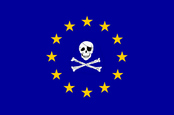This article is more than 1 year old
UN's freedom of expression top dog slams European copyright plans
Rapporteur David Kaye not impressed with Article 13
The campaign against a key aspect of new European copyright legislation has picked up a significant backer: the United Nations' freedom of expression expert.
David Kaye, the UN Special Rapporteur, has sent a lengthy letter to the European Commission outlining his concerns about Article 13 of the Copyright in the Digital Single Market Directive, which would require large internet platforms to introduce automated upload filters that remove copyrighted content.
Earlier this week, 70 internet luminaries including Vint Cerf, Tim Berners-Lee and Jimmy Wales warned that the proposal risked damaging "the free and open Internet as we know it" by shifting legal liability from users to platforms. Kaye agrees with that overall concern and has some additional concerns.
"I am very seriously concerned that the proposed Directive would establish a regime of active monitoring and prior censorship of user-generated content," Kaye - whose official title is special rapporteur on the promotion and protection of the right to freedom of opinion and expression - says in the nine-page letter [PDF], noting that such an approach would be "inconsistent" with international treaties in civil and political rights.
Among his concerns are that the proposal would "incentivize content-sharing providers to restrict at the point of upload user-generated content that is perfectly legitimate and lawful" i.e. apply overly strict filters in order to avoid a potential lawsuit.
He notes that while the legislation doesn't specify how content should be identified as copyright infringing "it couches the obligation to prevent the availability of copyright protected works in vague terms" that provide "considerable leeway for interpretation."
Given the enormous resources and determination of large media companies and their intellectual property lawyers, any opening in the law is likely to be used with zeal.
Complaints
Kaye is also concerned that because the blocking of content would be done by private entities i.e. Facebook et al, and that the systems for making complaints and getting decisions reversed are not going to be sufficiently robust.
"In the event that content blocking decisions are deemed invalid and reversed," he writes, "The complaint and redress mechanism established by private entities effectively assumes the role of providing access to remedies for violations of human rights law. I am concerned that such delegation would violate the State’s obligation to provide access to an 'effective remedy' for violations of rights specified under the Covenant."
He also reflects the same concerns as the internet folks when he worries that the requirement would fall heavily on smaller companies and non-profits. Large companies like Google and Facebook, while they can be expected to fight against the measure vigorously, have the means to do actually do it if it becomes law. Small companies without that level of resources will have a harder time and the law would "impose undue restrictions" on them, according to Kaye.
"Since nonprofits and small content sharing providers may not have the financial resources to establish licensing agreements with media companies and other right holders, they may be subject to onerous and legally ambiguous obligations to monitor and restrict the availability of copyright protected works on their platforms."
In short, he's not a fan and concludes that "automated filtering may be ill-equipped to perform assessments of context in the application of complex areas of law, such as copyright and counterterrorism."
In other words, don't do it. We shall see if the EC is listening. ®

